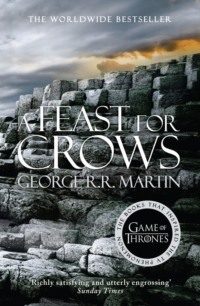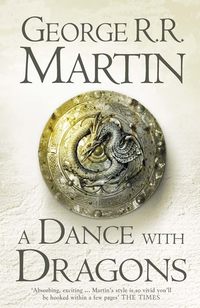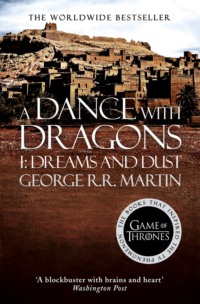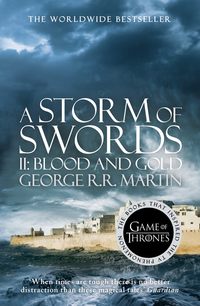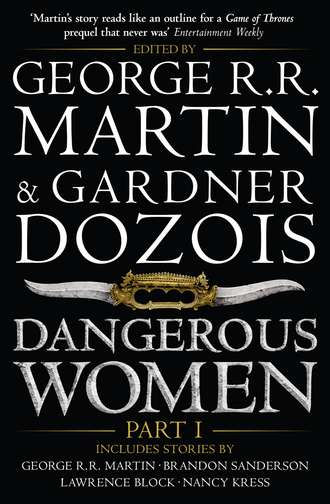
Полная версия
Dangerous Women. Part I
Aegon II was two-and-twenty, quick to anger and slow to forgive. Rhaenyra’s refusal to accept his rule enraged him. “I offered her an honorable peace, and the whore spat in my face,” he declared. “What happens now is on her own head.”
Even as he spoke, the Dance began. On Driftmark, the Sea Snake’s ships set sail from Hull and Spicetown to close the Gullet, choking off trade to and from King’s Landing. Soon after, Jacaerys Velaryon was flying north upon his dragon, Vermax, his brother Lucerys south on Arrax, whilst Prince Daemon rode Caraxes to the Trident.
Harrenhal had already once proved vulnerable from the sky, when Aegon the Dragon had overthrown it. Its elderly castellan Ser Simon Strong was quick to strike his banners when Caraxes lighted atop Kingspyre Tower. In addition to the castle, Prince Daemon at a stroke had captured the not-inconsiderable wealth of House Strong and a dozen valuable hostages, amongst them Ser Simon and his grandsons.
Meanwhile, Prince Jacaerys flew north on his dragon, calling upon Lady Arryn of the Vale, Lord Manderly of White Harbor, Lord Borrell and Lord Sunderland of Sisterton, and Cregan Stark of Winterfell. So charming was the prince, and so fearsome his dragon, that each of the lords he visited pledged their support for his mother.
Had his brother’s “shorter, safer” flight gone as well, much bloodshed and grief might well have been averted.
The tragedy that befell Lucerys Velaryon at Storm’s End was never planned, on this all of our sources agree. The first battles in the Dance of the Dragons were fought with quills and ravens, with threats and promises, decrees and blandishments. The murder of Lord Beesbury at the green council was not yet widely known; most believed his lordship to be languishing in some dungeon. Whilst sundry familiar faces were no longer seen about court, no heads had appeared above the castle gates, and many still hoped that that the question of succession might be resolved peaceably.
The Stranger had other plans. For surely it was his dread hand behind the ill chance that brought the two princelings together at Storm’s End, when the dragon Arrax raced before a gathering storm to deliver Lucerys Velaryon to the safety of the castle yard, only to find Aemond Targaryen there before him.
Prince Aemond’s mighty dragon Vhagar sensed his coming first. Guardsman walking the battlements of the castle’s mighty curtain walls clutched their spears in sudden terror when she woke, with a roar that shook the very foundations of Durran’s Defiance. Even Arrax quailed before that sound, we are told, and Luke plied his whip freely as he forced him down.
Lightning was flashing to the east and a heavy rain falling as Lucerys leapt off his dragon, his mother’s message clutched in his hand. He must surely have known what Vhagar’s presence meant, so it would have come as no surprise when Aemond Targaryen confronted him in the Round Hall, before the eyes of Lord Borros, his four daughters, septon, and maester, and two score knights, guards, and servants.
“Look at this sad creature, my lord,” Prince Aemond called out. “Little Luke Strong, the bastard.” To Luke he said, “You are wet, bastard. Is it raining, or did you piss yourself in fear?”
Lucerys Velaryon addressed himself only to Lord Baratheon. “Lord Borros, I have brought you a message from my mother, the queen.”
“The whore of Dragonstone, he means.” Prince Aemond strode forward, and made to snatch the letter from Lucerys’s hand, but Lord Borros roared a command and his knights intervened, pulling the princelings apart. One brought Rhaenyra’s letter to the dais, where his lordship sat upon the throne of the Storm Kings of old.
No man can truly know what Borros Baratheon was feeling at that moment. The accounts of those who were there differ markedly one from the other. Some say his lordship was red-faced and abashed, as a man might be if his lawful wife found him abed with another woman. Others declare that Borros appeared to be relishing the moment, for it pleased his vanity to have both king and queen seeking his support.
Yet all the witnesses agree on what Lord Borros said and did. Never a man of letters, he handed the queen’s letter to his maester, who cracked the seal and whispered the message into his lordship’s ear. A frown stole across Lord Borros’s face. He stroked his beard, scowled at Lucerys Velaryon, and said, “And if I do as your mother bids, which one of my daughters will you marry, boy?” He gestured at the four girls. “Pick one.”
Prince Lucerys could only blush. “My lord, I am not free to marry,” he replied. “I am betrothed to my cousin Rhaena.”
“I thought as much,” Lord Borros said. “Go home, pup, and tell the bitch your mother that the Lord of Storm’s End is not a dog that she can whistle up at need to set against her foes.” And Prince Lucerys turned to take his leave of the Round Hall.
But Prince Aemond drew his sword and said, “Hold, Strong!”
Prince Lucerys recalled his promise to his mother. “I will not fight you. I came here as an envoy, not a knight.”
“You came here as a craven and a traitor,” Prince Aemond answered. “I will have your life, Strong.”
At that Lord Borros grew uneasy. “Not here,” he grumbled. “He came an envoy. I want no blood shed beneath my roof.” So his guards put themselves between the princelings and escorted Lucerys Velaryon from the Round Hall, back to the castle yard where his dragon Arrax was hunched down in the rain, awaiting his return.
Aemond Targaryen’s mouth twisted in rage, and he turned once more to Lord Borros, asking for his leave. The Lord of Storm’s End shrugged and answered, “It is not for me to tell you what to do when you are not beneath my roof.” And his knights moved aside as Prince Aemond rushed to the doors.
Outside, the storm was raging. Thunder rolled across the castle, the rain fell in blinding sheets, and from time to time great bolts of blue-white lightning lit the world as bright as day. It was bad weather for flying, even for a dragon, and Arrax was struggling to stay aloft when Prince Aemon mounted Vhagar and went after him. Had the sky been calm, Prince Lucerys might have been able to outfly his pursuer, for Arrax was younger and swifter … but the day was black, and so it came to pass that the dragons met above Shipbreaker Bay. Watchers on the castle walls saw distant blasts of flame, and heard a shriek cut the thunder. Then the two beasts were locked together, lightning crackling around them. Vhagar was five times the size of her foe, the hardened survivor of a hundred battles. If there was a fight, it could not have lasted long.
Arrax fell, broken, to be swallowed by the storm-lashed waters of the bay. His head and neck washed up beneath the cliffs below Storm’s End three days later, to make a feast for crabs and seagulls. Prince Lucerys’s corpse washed up as well.
And with his death, the war of ravens and envoys and marriage pacts came to an end, and the war of fire and blood began in earnest.
On Dragonstone, Queen Rhaenyra collapsed when told of Luke’s death. Luke’s young brother Joffrey (Jace was still away on his mission north) swore a terrible oath of vengeance against Prince Aemond and Lord Borros. Only the intervention of the Sea Snake and Princess Rhaenys kept the boy from mounting his own dragon at once. As the black council sat to consider how to strike back, a raven arrived from Harrenhal. “An eye for an eye, a son for a son,” Prince Daemon wrote. “Lucerys shall be avenged.”
In his youth, Daemon Targaryen’s face and laugh were familiar to every cut-purse, whore, and gambler in Flea Bottom. The prince still had friends in the low places of King’s Landing, and followers amongst the gold cloaks. Unbeknownest to King Aegon, the Hand, or the Queen Dowager, he had allies at court as well, even on the green council … and one other go-between, a special friend he trusted utterly, who knew the wine sinks and rat pits that festered in the shadow of the Red Keep as well as Daemon himself once had, and moved easily through the shadows of the city. To this pale stranger he reached out now, by secret ways, to set a terrible vengeance into motion.
Amidst the stews of Flea Bottom, Prince Daemon’s go-between found suitable instruments. One had been a serjeant in the City Watch; big and brutal, he had lost his gold cloak for beating a whore to death whilst in a drunken rage. The other was a rat-catcher in the Red Keep. Their true names are lost to history. They are remembered as Blood and Cheese.
The hidden doors and secret tunnels that Maegor the Cruel had built were as familiar to the rat-catcher as to the rats he hunted. Using a forgotten passageway, Cheese led Blood into the heart of the castle, unseen by any guard. Some say their quarry was the king himself, but Aegon was accompanied by the Kingsguard wherever he went, and even Cheese knew of no way in and out of Maegor’s Holdfast save over the drawbridge that spanned the dry moat and its formidable iron spikes.
The Tower of the Hand was less secure. The two men crept up through the walls, bypassing the spearmen posted at the tower doors. Ser Otto’s rooms were of no interest to them. Instead they slipped into his daughter’s chambers, one floor below. Queen Alicent had taken up residence there after the death of King Viserys, when her son Aegon moved into Maegor’s Holdfast with his own queen. Once inside, Cheese bound and gagged the Dowager Queen whilst Blood strangled her bedmaid. Then they settled down to wait, for they knew it was the custom of Queen Helaena to bring her children to see their grandmother every evening before bed.
Blind to her danger, the queen appeared as dusk was settling over the castle, accompanied by her three children. Jaehaerys and Jaehaera were six, Maelor two. As they entered the apartments, Helaena was holding his little hand and calling out her mother’s name. Blood barred the door and slew the queen’s guardsman, whilst Cheese appeared to snatch up Maelor. “Scream and you all die,” Blood told Her Grace. Queen Helaena kept her calm, it is said. “Who are you?” she demanded of the two. “Debt collectors,” said Cheese. “An eye for an eye, a son for a son. We only want the one, t’ square things. Won’t hurt the rest o’ you fine folks, not one lil’ hair. Which one you want t’ lose, Your Grace?”
Once she realized what he meant, Queen Helaena pleaded with the men to kill her instead. “A wife’s not a son,” said Blood. “It has to be a boy.” Cheese warned the queen to make a choice soon, before Blood grew bored and raped her little girl. “Pick,” he said, “or we kill them all.” On her knees, weeping, Helaena named her youngest, Maelor. Perhaps she thought the boy was too young to understand, or perhaps it was because the older boy, Jaehaerys, was King Aegon’s firstborn son and heir, next in line to the Iron Throne. “You hear that, little boy?” Cheese whispered to Maelor. “Your momma wants you dead.” Then he gave Blood a grin, and the hulking swordsman slew Prince Jaehaerys, striking off the boy’s head with a single blow. The queen began to scream.
Strange to say, the rat-catcher and the butcher were true to their word. They did no further harm to Queen Helaena or her surviving children, but rather fled with the prince’s head in hand.
Though Blood and Cheese had spared her life, Queen Helaena cannot be said to have survived that fateful dusk. Afterward she would not eat, nor bathe, nor leave her chambers, and she could no longer stand to look upon her son Maelor, knowing that she had named him to die. The king had no recourse but to take the boy from her and give him over to his mother, the Dowager Queen Alicent, to raise as if he were her own. Aegon and his wife slept separately thereafter, and Queen Helaena sank deeper and deeper into madness, whilst the king raged, and drank, and raged.
Now the bloodletting began in earnest.
The fall of Harrenhal to Prince Daemon came as a great shock to His Grace. Until that moment, Aegon II had believed his half sister’s cause to be hopeless. Harrenhal left His Grace feeling vulnerable for the first time. Subsequent rapid defeats at the Burning Mill and Stone Hedge came as further blows, and made the king realize that his situation was more perilous than it had seemed. These fears deepened as ravens returned from the Reach, where the greens had believed themselves strongest. House Hightower and Oldtown were solidly behind King Aegon, and His Grace had the Arbor too … but elsewhere in the south, other lords were declaring for Rhaenyra, amongst them Lord Costayne of Three Towers, Lord Mullendore of Uplands, Lord Tarly of Horn Hill, Lord Rowan of Goldengrove, and Lord Grimm of Greyshield.
Other blows followed: the Vale, White Harbor, Winterfell. The Blackwoods and the other river lords streamed toward Harrenhal and Prince Daemon’s banners. The Sea Snake’s fleets closed Blackwater Bay, and every morning King Aegon had merchants whining at him. His Grace had no answer for their complaints, beyond another cup of strongwine. “Do something,” he demanded of Ser Otto. The Hand assured him that something was being done; he had hatched a plan to break the Velaryon blockade. One of the chief pillars of support for Rhaenyra’s claim was her consort, yet Prince Daemon represented one of her greatest weaknesses as well. The prince had made more foes than friends during the course of his adventures. Ser Otto Hightower, who had been amongst the first of those foes, was reaching across the narrow sea to another of the prince’s enemies, the Kingdom of the Three Daughters, hoping to persuade them to move against the Sea Snake.
The delay did not sit well with the young king. Aegon II had run short of patience with his grandfather’s prevarications. Though his mother the Dowager Queen Alicent spoke up in Ser Otto’s defense, His Grace turned a deaf ear to her pleading. Summoning Ser Otto to the throne room, he tore the chain of office from his neck and tossed it to Ser Criston Cole. “My new Hand is a steel fist,” he boasted. “We are done with writing letters.” Ser Criston wasted no time in proving his mettle. “It is not for you to plead for support from your lords, like a beggar pleading for alms,” he told Aegon. “You are the lawful king of Westeros, and those who deny it are traitors. It is past time they learned the price of treason.”
King Aegon’s master of whisperers, Larys Strong the Clubfoot, had drawn up a list of all those lords who gathered on Dragonstone to attend Queen Rhaenyra’s coronation and sit on her black council. Lords Celtigar and Velaryon had their seats on islands; as Aegon II had no strength at sea, they were beyond the reach of his wroth. Those “black” lords whose lands were on the mainland enjoyed no such protection, however.
Duskendale fell easily, taken by surprise by the King’s forces, the town sacked, the ships in the harbor set afire, Lord Darklyn beheaded. Rook’s Rest was Ser Criston’s next objective. Forewarned of their coming, Lord Staunton closed his gates and defied the attackers. Behind his walls, his lordship could only watch as his fields and woods and villages were burned, his sheep and cattle and smallfolk put to the sword. When provisions inside the castle began to run low, he dispatched a raven to Dragonstone, pleading for succor.
Nine days after Lord Staunton dispatched his plea for help, the sound of leathern wings was heard across the sea, and the dragon Meleys appeared above Rook’s Rest. The Red Queen, she was called, for the scarlet scales that covered her. The membranes of her wings were pink, her crest, horns, and claws bright as copper. And on her back, in steel and copper armor that flashed in the sun, rode Rhaenys Targaryen, the Queen Who Never Was.
Ser Criston Cole was not dismayed. Aegon’s Hand had expected this, counted on it. Drums beat out a command, and archers rushed forward, longbowmen and crossbowmen both, filling the air with arrows and quarrels. Scorpions were cranked upwards to loose iron bolts of the sort that had once felled Meraxes in Dorne. Meleys suffered a score of hits, but the arrows only served to make her angry. She swept down, spitting fire to right and left. Knights burned in their saddles as the hair and hide and harness of their horses went up in flames. Men-at-arms dropped their spears and scattered. Some tried to hide behind their shields, but neither oak nor iron could withstand dragon’s breath. Ser Criston sat on his white horse shouting, “Aim for the rider,” through the smoke and flame. Meleys roared, smoke swirling from her nostrils, a stallion kicking in her jaws as tongues of fire engulfed him.
Then came an answering roar. Two more winged shapes appeared: the king astride Sunfyre the Golden, and his brother Aemond upon Vhagar. Criston Cole had sprung his trap, and Rhaenys had come snatching at the bait. Now the teeth closed round her.
Princess Rhaenys made no attempt to flee. With a glad cry and a crack of her whip, she turned Meleys toward the foe. Against Vhagar alone she might have had some chance, for the Red Queen was old and cunning, and no stranger to battle. Against Vhagar and Sunfyre together, doom was certain. The dragons met violently a thousand feet above the field of battle, as balls of fire burst and blossomed, so bright that men swore later that the sky was full of suns. The crimson jaws of Meleys closed round Sunfyre’s golden neck for a moment, till Vhagar fell upon them from above. All three beasts went spinning toward the ground. They struck so hard that stones fell from the battlements of Rook’s Rest half a league away.
Those closest to the dragons did not live to tell the tale. Those farther off could not see, for the flame and smoke. It was hours before the fires guttered out. But from those ashes, only Vhagar rose unharmed. Meleys was dead, broken by the fall and ripped to pieces upon the ground. And Sunfyre, that splendid golden beast, had one wing half torn from his body, whilst his royal rider had suffered broken ribs, a broken hip, and burns that covered half his body. His left arm was the worst. The dragonflame had burned so hot that the king’s armor had melted into his flesh.
A body believed to be Rhaenys Targaryen was later found beside the carcass of her dragon, but so blackened that no one could be sure it was her. Beloved daughter of Lady Jocelyn Baratheon and Prince Aemon Targaryen, faithful wife to Lord Corlys Velaryon, mother and grandmother, the Queen Who Never Was lived fearlessly, and died amidst blood and fire. She was fifty-five years old.
Eight hundred knights and squires and common men lost their lives that day as well. Another hundred perished not long after, when Prince Aemond and Ser Criston Cole took Rook’s Rest and put its garrison to death. Lord Staunton’s head was carried back to King’s Landing and mounted above the Old Gate … but it was the head of the dragon Meleys, drawn through the city on a cart, that awed the crowds of smallfolk into silence. Thousands fled King’s Landing afterward, until the Dowager Queen Alicent ordered the city gates closed and barred.
King Aegon II did not die, though his burns brought him such pain that some say he prayed for death. Carried back to King’s Landing in a closed litter to hide the extent of his injuries, His Grace did not rise from his bed for the rest of the year. Septons prayed for him, maesters attended him with potions and milk of the poppy, but Aegon slept nine hours out of every ten, waking only long enough to take some meagre nourishment before he slept again. None was allowed to disturb his rest, save his mother the Queen Dowager and his Hand, Ser Criston Cole. His wife never so much as made the attempt, so lost was Helaena in her own grief and madness.
The king’s dragon, Sunfyre, too huge and heavy to be moved, and unable to fly with his injured wing, remained in the fields beyond Rook’s Rest, crawling through the ashes like some great golden wyrm. In the early days, he fed himself upon the burned carcasses of the slain. When those were gone, the men Ser Criston had left behind to guard him brought him calves and sheep.
“You must rule the realm now, until your brother is strong enough to take the crown again,” the King’s Hand told Prince Aemond. Nor did Ser Criston need to say it twice. And so one-eyed Aemond the Kinslayer took up the iron-and-ruby crown of Aegon the Conquerer. “It looks better on me than it ever did on him,” the prince proclaimed. Yet Aemond did not assume the style of king, but named himself only Protector of the Realm and Prince Regent. Ser Criston Cole remained Hand of the King.
Meanwhile, the seeds Jacaerys Velaryon had planted on his flight north had begun to bear fruit, and men were gathering at White Harbor, Winterfell, Barrowton, Sisterton, Gulltown, and the Gates of the Moon. Should they join their strength with that of the river lords assembling at Harrenhal with Prince Daemon, even the strong walls of King’s Landing might not be able to withstand them, Ser Criston warned the new Prince Regent.
Supremely confident in his own prowess as a warrior and the might of his dragon Vhagar, Aemond was eager to take the battle to the foe. “The whore on Dragonstone is not the threat,” he said. “No more than Rowan and these traitors in the Reach. The danger is my uncle. Once Daemon is dead, all these fools flying our sister’s banners will run back to their castles and trouble us no more.”
East of Blackwater Bay, Queen Rhaenyra was also faring badly. The death of her son Lucerys had been a crushing blow to a woman already broken by pregnancy, labor, and stillbirth. When word reached Dragonstone that Princess Rhaenys had fallen, angry words were exchanged between the queen and Lord Velaryon, who blamed her for his wife’s death. “It should have been you,” the Sea Snake shouted at Her Grace. “Staunton sent to you, yet you left it to my wife to answer, and forbade your sons to join her!” For as all the castle knew, the princes Jace and Joff had been eager to fly with Princess Rhaenys to Rook’s Rest with their own dragons.
It was Jace who came to the fore now, late in the year 129 AC. First he brought the Lord of the Tides back into the fold by naming him the Hand of the Queen. Together he and Lord Corlys began to plan an assault upon King’s Landing.
Mindful of the promise he had made to the Maiden of the Vale, Jace ordered Prince Joffrey to fly to Gulltown with Tyraxes. Munkun suggests that Jace’s desire to keep his brother far from the fighting was paramount in this decision. This did not sit well with Joffrey, who was determined to prove himself in battle. Only when told that he was being sent to defend the Vale against King Aegon’s dragons did he grudgingly consent to go. Rhaena, the thirteen-year-old daughter of Prince Daemon by Laena Velaryon, was chosen to accompany him. Known as Rhaena of Pentos, for the city of her birth, she was no dragonrider, her hatchling having died some years before, but she brought three dragon’s eggs with her to the Vale, where she prayed nightly for their hatching. The Prince of Dragonstone also had a care for the safety of his half brothers, Aegon the Younger and Viserys, aged nine and seven. Their father Prince Daemon had made many friends in the Free City of Pentos during his visits there, so Jacaerys reached across the narrow sea to the prince of that city, who agreed to foster the two boys until Rhaenyra had secured the Iron Throne. In the waning days of 129 AC, the young princes boarded the cog Gay Abandon—Aegon with Stormcloud, Viserys clutching his egg – to set sail for Essos. The Sea Snake sent seven of his warships with them as escort, to see that they reached Pentos safely.
With Sunfyre wounded and unable to fly near Rook’s Rest, and Tessarion with Prince Daeron in Oldtown, only two mature dragons remained to defend King’s Landing … and Dreamfyre’s rider, Queen Helaena, spent her days in darkness, weeping, and surely could not be counted as threat. That left only Vhagar. No living dragon could match Vhagar for size or ferocity, but Jace reasoned that if Vermax, Syrax, and Caraxes were to descend on King’s Landing all at once, even “that hoary old bitch” would be unable to withstand them. Yet so great was Vhagar’s repute that the prince hesitated, considering how he might add more dragons to his attack.
House Targaryen had ruled Dragonstone for more than two hundred years, since Lord Aenar Targaryen first arrived from Valyria with his dragons. Though it had always been their custom to wed brother to sister and cousin to cousin, young blood runs hot, and it was not unknown for men of the House to seek their pleasures amongst the daughters (and even the wives) of their subjects, the smallfolk who lived in the villages below the Dragonmont, tillers of the land and fishers of the sea. Indeed, until the reign of King Jaehaerys and Good Queen Alysanne, the ancient law of the first night had prevailed on Dragonstone, as it did throughout Westeros, whereby it was the right of a lord to bed any maiden in his domain upon her wedding night.



